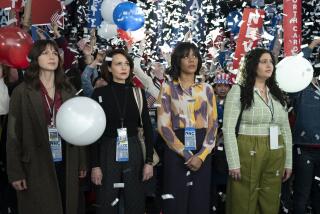‘The Slap: A Novel’ by Christos Tsiolkas
The Slap
A Novel
Christos Tsiolkas
Penguin: 482 pp., $15 paper
Christos Tsiolkas does something rather clever early on in his entertaining novel “The Slap,” a story that plumbs the layers of society that make up modern Australia. The book, which won the Commonwealth Writers’ Prize, focuses on a trio of longtime female friends living in Melbourne who are drifting into the point of their lives where previously held certainties are suddenly anything but. There are domestic themes, familiar trappings and issues here, but he tips us off that his book won’t be a rote story about the suburbs, upwardly mobile professionals and those just trying to make it in the middle class, nor will it be a didactic tale about multicultural society and the tensions between progressive and conservative thinking.
Anouk, a stylish Jewish woman in her early 40s, and one of those three female friends, is a successful writer for a “soapie” that has decided to go ahead with a bold, socially responsible (and cynical) episode about incest. She gets yelled at for writing a purposively provocative draft, then dutifully goes home to write up a new one:
“She was quick, efficient, reducing the narrative to exposition and small, dramatic arcs that resolved snuggly within commercial breaks, peppering the mundane dialogue with easy, disposable slang.... Her treacherous, vengeful teenage girl retreated back to being a damaged imbecile and the teacher a supportive drone, mouthing all the accepted platitudes of victim rights and girl power. The only character she felt any affection for was the rapist father.”
Tsiolkas has as much desire to pass simple judgment on the pursuit of the Australian Dream (which seems identical to the American one) in his novel as Anouk does in creating two-dimensional people for her show. “The Slap” isn’t perverse like Anouk’s first draft, gratuitously upending our expectations about certain roles. But like a solid, tightly written TV series, it tells a layered, briskly paced story about complex people. Think Tom Wolfe meets Philip Roth. Or “The Sopranos” meets “The Real Housewives of Orange County.” (That’s not an idle comparison; Tsiolkas is also a noted screenwriter and playwright.)
Tsiolkas has an easy way of detailing characters’ clothes, furniture, cars, electronics and brand preferences and a fantastic working knowledge of pop culture — slang and music (and drugs) of every currency. He also neatly dissects the allure of money and what it can buy. So that’s the glossy part of the novel. But then he has the admirable ambition and the skill to portray as intimately as he can the inner and private lives of his characters, none of whom are completely what they seem to be when introduced at a barbecue at the house of Hector and Aisha (the other part of the trio, along with Rosie, one of the few blond Australians — that is, white nonimmigrant people — in the story).
It’s at this barbecue that the titular assault happens. Hector’s cousin Harry, the closest thing here to a “rapist father”-type, strikes Rosie’s toddler son, who is about to bash Harry’s 9-year-old boy with a cricket bat. The story progresses from there, told from the viewpoints of eight of the characters. As Rosie presses charges and a court date looms, that startling crack forces close people to take sides. Ultimately, the slap serves as the sound of a starter gun, spurring nearly every person who witnessed it toward a soulful reckoning.
Hard-bitten Anouk, brittle and damaged Rosie and pacific Aisha are the readily identifiable heart of the novel, and two of them will be altered the most, forced to accept or reject their present lives. Through them Tsiolkas explores the demands and rewards of motherhood, the perils and the peace of sacrifice, and the evolution from the young women they were for so long to the mature (if no less uncertain) women they have become. All three are sympathetic in their devotion to one another and compelling in their doubts and flaws.
And there are so many doubt-ridden and flawed beings here, where no one can say what they mean to say. It is the natural state of the world in “The Slap,” where these traits are spotlighted through a number of events rattling the routine lives of not just the women, but of their in-laws, spouses, co-workers, even their baby-sitters. There are thoughtless affairs and abandonment to contend with, old age and disillusionment, and addled youth and something that looks like hope because it’s so full of joy and optimism, but that we know will inevitably lead somewhere else. As Aisha describes it, a feeling of “What couldn’t be, what you didn’t ever want to be, but in which you could not help wondering what could have been.”
What impresses are the seriousness and sensitivity with which Tsiolkas handles his themes while keeping his narrative tight and detailed. Sometimes it seems as if his story is going to get away from him: Aisha, Rosie and Anouk fawning over each other on a girls’ outing, or an aunt going into a rapture on her youth in the ‘80s to her teen niece, or seemingly thuggish teens being unexpectedly noble. Then he kicks out the block supporting our suspicions, making one feel guilty for denying these characters some uncomplicated happiness and affection. We all know too well life offers heavy blows with its sweet kisses.
Villalon is a San Francisco writer and critic whose work has appeared in the Virginia Quarterly Review, NPR.org and the Believer. He is the former book editor of the San Francisco Chronicle.
More to Read
The biggest entertainment stories
Get our big stories about Hollywood, film, television, music, arts, culture and more right in your inbox as soon as they publish.
You may occasionally receive promotional content from the Los Angeles Times.






